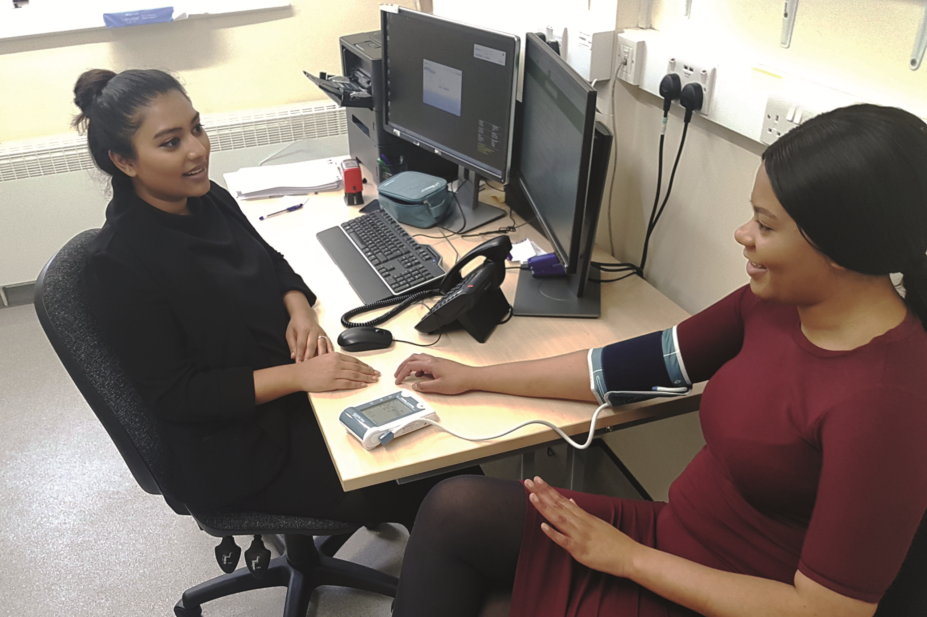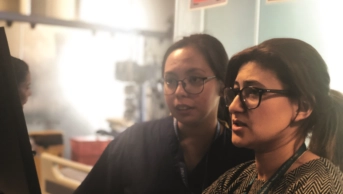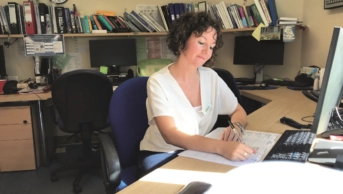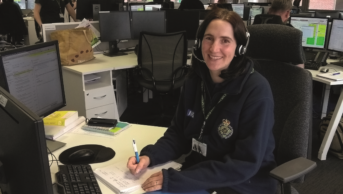
Courtesy of Shivani Patel
I work as part of the AT Medics Central Pharmacist Team, based in Lambeth, London, which supports larger AT Medics surgeries with telephone triage clinics to help manage acute, on the day demand. Although I am on the Central Pharmacist Team, I represent each practice to improve medicines safety and manage clinical administrative workflow.
My typical day consists of 50 phone consultations. A few of the senior pharmacists may have face-to-face consultations on the same day to conduct ear, throat and chest examinations. Physical examination is a skill I aim to develop over the next few months, as it will support me in my goal of becoming an independent prescriber.
My scope of practice is set with developmental plans and intensive training in place. As a newly registered pharmacist, I am expected to complete an extensive initial induction and training programme delivered by in-house GPs. Additionally, all pharmacists attend fortnightly web-based workshops to support ongoing learning.
The training I have received has led to a dramatic increase in competency and professional development through case-based discussions, all of which support the change in General Pharmaceutical Council revalidation requirements.
9:00 start
My work day starts at 9:00. During my morning triage clinic, I contact patients requiring assistance for minor conditions or who have medication queries; these are mostly resolved efficiently over the phone.
A session can consist of pain management queries, conjunctivitis or urinary tract infections. On average, 3 out of 25 patients are more complex and are recalled to a practitioner at a local GP surgery.
AT Medics is currently developing a mobile application called ‘Dr.iQ’. One of the features will enable video consultations with a clinician — we anticipate this will help address patient demands, allowing patients to be examined without taking time off work.
12:00
At midday, I review lab tests and action abnormal results appropriately. For example, this could be a diabetic patient’s urinary glucose samples highlighting the need for optimisation of their antidiabetic medication or another patient’s low ferritin and full blood count indicating an iron deficiency requiring supplementation. Lab test results are assigned to the most appropriate practitioner by ‘EZ Doc’, an electronic tool used by all of our surgeries.
Our recall protocol ensures relevant monitoring tests are conducted for anti-epileptics and various other high-risk drugs. We first gather data on high-risk patients from across our sites using our business intelligence tool, EZ Analytics. We recall those patients then audit data from our patient interactions to evaluate the impact of our interventions on safety. This audit process recently featured in a positive inspection by the Care Quality Commission at one of our practices.
Clinical correspondence from outpatient clinics and discharge summaries are also reviewed by pharmacists. Administrative staff have been trained to recognise discharge summaries and outpatient clinic letters and assign them to a pharmacist to review and action using the EZ Doc system.
14:00
In the afternoon I have a long-term conditions clinic. This consists of 20-minute, face-to-face annual reviews of patients with diabetes, hypertension and asthma; on average, 8–10 patients are seen per day. Advanced practitioners also manage heart failure and mental health reviews.
Pharmacists generally have longer appointment slots and carry out opportunistic medication reviews. In contrast, a doctor may not be able to cover a foot check in addition to a medication review, which is likely to result in the patient being recalled. Having pharmacists who can carry out all diabetes care processes while simultaneously optimising therapy is more convenient for the patient.
We also proactively carry out depression medication reviews and signpost patients to relevant services, such as talking therapy in line with the NHS mental health agenda. We can intervene and book urgent appointments for those patients at high risk of self harm.
This service has added an additional care element for our patients who consistently provide positive feedback on these reviews.
17:00 finish
I finish work at 17:00 on most days. Most of my administrative tasks have been completed during the day, so there is little paperwork which needs to be looked at before going home.
How to get a job as a GP pharmacist
Many GP roles are advertised through the NHS jobs website, which is the portal I used to apply for my role.
Reaching out to GP surgeries in order to shadow practice pharmacists is also often welcomed and would strengthen applications.
During interviews, the key is to share experiences where you have had to adapt to new environments effectively and show an interest in developing new skills.
Additionally, speak about any implementations made in order to improve current practice. For example, during my interview, I spoke about my role in preparing a pharmacy for a clinical governance inspection.
For more information visit:
- Centre for Pharmacy Postgraduate Eduction
- Primary Care Pharmacy Association
- The Royal Pharmaceutical Society
Tarek Radwan (GP director), Omar Din


